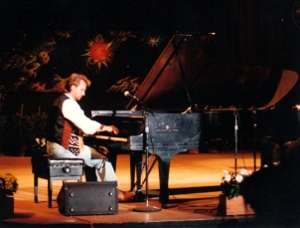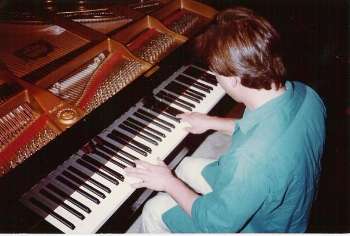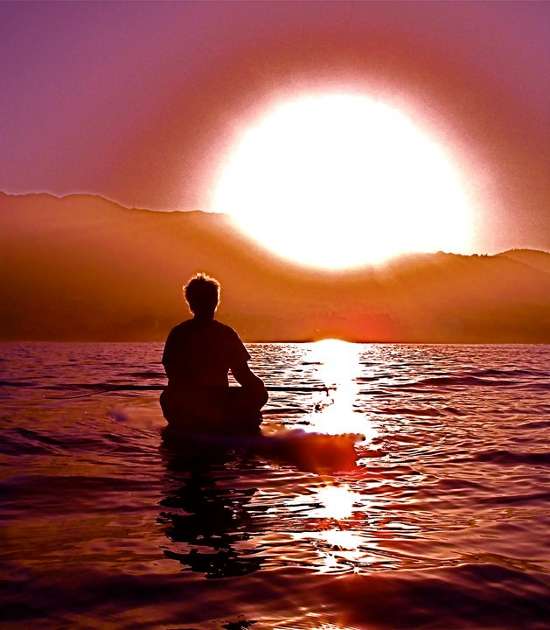Interview with Peter Kater–a pianist par excellence
It often takes patience and your staunch steadfastness to your art before laurels start pouring in–well, in the case of Peter Kater, the saying stood true. Nominated for the Grammys for more than a dozen time, Peter won the award in 2018.
We had an email interview with Peter.
Q1. Tell us about your childhood. Revisiting those days, how you liked music?
As a child I was made to play the piano. My Mother asked me if I wanted to play an instrument. I said “no”. She said “But if you did want to play an instrument what would it be?”. I thought about it and said “A wind instrument, saxophone or trombone . . . something that uses the breath”. She said “No, you’re going to play the piano.”
So, my piano lessons began at the age of 7. Six years of classical training ensued and I didn’t like it too much. I liked the idea of music, but I didn’t like playing rigid songs that needed to be played exactly so. Finally, when I was a teenager, I found a teacher that taught me how to improvise. How to play any song from a simple lead sheet (melody and chord changes) and play it in any style, tempo or mood. That’s when my music started becoming alive.
 Q2. Your training—where you took it and how was the experience? Do you liked the schedule where you sat hours practicing while other children played games and made merry?
Q2. Your training—where you took it and how was the experience? Do you liked the schedule where you sat hours practicing while other children played games and made merry?
No, I didn’t like it. I somet, es would not get dinner if i didn’t practice. I wasn’t able to do many things if i didn’t practice. Even when my parents first bought me a piano, I felt sick to my stomach because I really didn’t want to have to be that disciplined.
Q3. Your instrument, piano—what specialty made you pick it?
I answered that in question 1.
Q4. When it comes to composing music, which element you like to take care most—rhythm, harmony, mood, or simply the genre?
I don’t have any rules about that, but it DOES seem that I start with melody more often. Then, I go to the piano and find the melody, careful to find it in the same key that I hear it in my head. Then, I proceed to work with the song for as long as I feel that I’m staying “true” to the initial thread or inspiration.
Q5. How do you like the element of experimentalism in your music—performing with improvisation and creating something new, on-stage?
That happens to be my specialty. Been doing that since I was 18 years old. From 18 through 24 years old, I’d throw myself into performance situations 4-6 nights per week, 3-4 hours per night and just improvise the night away. Then, I’d invite other musicians to join me in improvising as well. Sometimes, we’d pick what key to start in, sometimes not. Very interesting.
Q6. You have explored various platforms of performance: recording, on-stage, films, serials, collaborating with other musicians. Which one of them was most satisfying to you and why?
At this point I really love it all. It just depends on what mood I’m in. Sometimes, I yearn to play by myself, sometimes with others, sometimes I want to create some music for a visual like a film or video. Fortunately, I seem to have opportunities to do it all at different times.
 Q7. Talking about the inspiration behind your music, what makes you move inside and feel that a musical piece could be created?
Q7. Talking about the inspiration behind your music, what makes you move inside and feel that a musical piece could be created?
It kind of comes upon me suddenly. Sometimes, after a particularly wonderful experience or hard experience. I’m often very inspired by Nature. I give myself lots of space to move through my creativity without a lot of demand or expectation. But when I have a deadline and need a new song or some new material, I ask for it. I tell myself, my muse, my consciousness that I need a song by tomorrow morning, please. Sounds funny I know, but usually works out for me.
Q8. What you value more—a nomination or winning awards or appreciation of music lovers?
A nomination or award is very exciting and satisfying to the ego. But appreciation from someone in a sincere and heartfelt expression is a connection to the soul and much more moving. Not to say some awards can’t be soul connected and moving as well, but my goal has always been to do “meaningful” work, not “marketable” work.
Q9. Tell us how collaborating with other artists helped you understand music better and increase your own repertoire?
Collaborating with other artists (that you respect) is a very valuable and transformative experience. The first thing it teaches you is how to “listen”. Listening is the single most important element to any creative process. People that get caught up in “being creative” are simply exercising their egos to various degrees. If they’re not listening to either who their playing with, or (if they’re playing along) listening to themselves, patiently, slowly, note by note, then they’re not really participating in the creative process. Just regurgitating information and phrases.
Q10. Tell us about your instruments and other tools you use to create music.
I just really love the acoustic grand piano. I do use some synths but only for ambient space and environmental stuff, never as a lead instrument. I’m an acoustic junky (except when it comes to electric guitars and bases).
Q11. Apart from music, what else you like to keep yourself busy in?
I love nature. I try and watch the sunset every night if possible. And I don’t mean sit and watch the sun go down as I’m chatting with others and walking around. I mean sitting completely 100% focused on watching the sun go down from about an hour before it sets till about a half hour afterwards, usually alone and in complete silence. It’s extremely powerful for me. I love to swim in the ocean, paddle board, do yoga regularly, I love to eat very healthy and cook very healthy. I love raw foods and don’t eat any glutens or sugars or dairy. I’m very focused on my inner health and spiritual perspective. And I love SUSHI and SAKE!!!
Q12. Do you feel music is an exclusive choice for you—if it were to be, what else you would have done if not music?
I have no idea. I’ve been playing music since I was 7 years old and have never done anything else. Sometimes I think I could work with children or with people in need–humanitarian work; work that benefits the planet. I try and combine that with my music whenever possible.
Q13. A message for our readers and budding pianists.
I think a key to living a rewarding life and being a good musician is being “present” and “Listening”. I know it sounds a little “anti-climactic”. But being “present” in your life, with your self and in any situation is absolutely KEY to a full experience. And listening is KEY to being present. As a musician, play one note or one chord and listen to it, feel it, absorb it and then express your feeling and response to that with another note or chord, or combination thereof and then listen to that. Take a deep breath. Then when you feel like you’ve understood that expression then respond to it as well, then listen to that. And so on and so on. There’s no hurry. There’s no place to go. Nothing to achieve. If you can being present with yourself you’ve already found all there is to explore.
